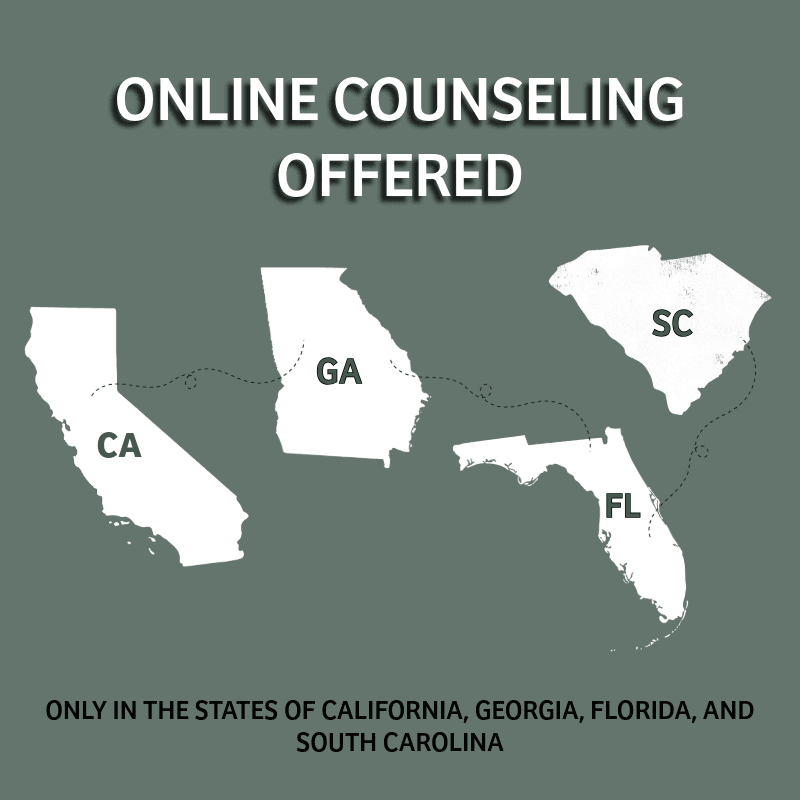THERAPY SPECIALTY
Faith-Based Counseling
Respectful, Confidential, and Compassionate Counseling for Every Faith and Value System
Counseling That Honors Your Faith and Values
When life feels overwhelming, faith can be a source of hope, comfort, and direction. But during challenging seasons, it can also be hard to hold on to that anchor. Faith-based counseling offers a safe, supportive space to explore life’s difficulties while staying connected to your spiritual beliefs and values.
At JCACounseling, we work with individuals, teens, couples, and families from a variety of religious and spiritual traditions — including Christianity, Judaism, Islam, Hinduism, Buddhism, and many other belief systems. We’re not here as religious authorities or experts, but as highly trained therapists who can integrate your faith and values into the healing process, if you choose.
Guided by values, grounded in care.
Why Safe, Faith-Integrated Care Matters
Many people find strength and meaning in their faith. Others may be wrestling with questions, doubts, or complicated feelings about spirituality. Either way, your beliefs deserve to be respected in therapy. Faith-based counseling can help you feel: - Seen: understood in the context of your culture, values, and faith traditions - Safe: knowing you can share your beliefs without judgment - Supported: with coping strategies that align with your values and worldview
How Faith-Based Counseling Helps
Our approach combines clinically proven counseling techniques with your personal faith perspective. You set the pace and decide how much your spiritual beliefs play a role in the work we do together. This may include:
- Exploring how faith can serve as a coping tool in daily life
- Identifying and honoring the values that guide your decisions
- Integrating practices like prayer, meditation, gratitude, or scripture from your tradition
- Creating space to process doubts, questions, and spiritual pain without judgment
Strengthening resilience through meaning, hope, and connection
- Exploring how faith can serve as a coping tool in daily life
- Identifying and honoring the values that guide your decisions
- Integrating practices like prayer, meditation, gratitude, or scripture from your tradition
- Creating space to process doubts, questions, and spiritual pain without judgment Strengthening resilience through meaning, hope, and connection
What to Expect in Faith-Based Counseling
We begin with a conversation about your goals, your values, and whether you’d like your faith to be part of the process. From there, we design sessions tailored to your needs — blending therapeutic approaches with spiritual integration in a way that feels right for you. Some clients choose to incorporate prayer or spiritual reflection into sessions; others focus primarily on emotional or relational concerns while knowing their values will be respected at every step. Our role is to meet you where you are and walk alongside you. Throughout your counseling journey, you can expect: - Confidential, nonjudgmental support - A therapist who affirms and respects your identity - Practical tools to handle daily challenges - Opportunities to build resilience and self-compassion
Over time, people often see:
- Greater peace and clarity rooted in personal values and beliefs - Renewed hope and meaning during difficult seasons - Stronger emotional resilience through faith-based coping tools - Healthier relationships with self, others, and community - Increased ability to handle stress while staying aligned with core values - A deeper sense of connection — to self, others, and, for some, to God or a higher power
Challenges Faith-Based Counseling Can Support
Faith-based therapy can help if you are:
- Using your faith as a source of strength while facing anxiety, depression, grief, or trauma
- Feeling spiritually disconnected or wrestling with questions of meaning or purpose
- Seeking to incorporate prayer, meditation, or other spiritual practices into counseling
- Navigating relationship or family challenges while honoring your values
- Facing a life transition and wanting guidance rooted in both evidence-based care and your faith tradition
- A parent wanting to pass down values while supporting your child’s emotional well-being
Affirming counseling recognizes these realities and creates a space where you can heal, grow, and thrive as your authentic self.
Christian counseling
Christian counseling is for those who want their faith to be part of the healing process. It blends Biblical wisdom with therapeutic practices, offering guidance that strengthens both spiritual and emotional well-being.
For couples, Christian marriage counseling provides a space to rebuild trust, improve communication, and deepen connection through shared faith.
Families may find that Christian family counseling supports stronger bonds, helping parents and children grow together with values rooted in scripture.
Some clients seek Biblical counseling specifically, which emphasizes spiritual guidance and scripture-centered wisdom as the foundation for growth. Others prefer a broader faith-based counseling approach, where Christian values are integrated with practical tools for navigating life’s challenges.
No matter the path, Christian counseling offers support that honors your beliefs and helps you move forward with hope and strength.
JEWISH COUNSELING
Jewish counseling offers support that respects and draws from Jewish values, traditions, and spiritual practices. Whether you’re seeking healing, guidance, or simply someone who understands your faith journey, Jewish counseling gives a space where your heritage is honored alongside your emotional and mental health needs. For families, Jewish family counseling helps nurture communication, strengthen relationships, and navigate life’s challenges through rituals, tradition, and shared values. Couples may turn to Jewish marriage counseling to deepen their partnership with the wisdom of Torah-based insights, fostering trust, shared goals, and faith-centered growth. Our Jewish therapists integrate spiritual reflection, Jewish thought, and cultural sensitivity into therapy. If you want counseling with Jewish values, you will find compassionate guidance that connects your emotional healing with meaning and purpose. Jewish spiritually integrated therapy isn’t about replacing traditional therapy—it’s about blending it with what makes your soul feel seen and grounded.
Faith as a Coping Tool
Faith can be a powerful resource for resilience. Studies on spirituality and mental health indicate that prayer, meditation, and values-based practices can reduce anxiety, improve emotional regulation, and enhance coping during life transitions.
Counseling can help you leverage these tools in practical, personalized ways.
Ways faith supports mental wellness: - Using prayer, meditation, or reflection to manage stress and emotional challenges - Drawing on personal beliefs to build resilience, hope, and a sense of purpose - Applying spiritual or moral values to guide decisions, relationships, and everyday choices - Integrating faith into strategies for overcoming depression, anxiety, grief, or life transitions - This approach helps clients cultivate a sense of meaning, empowerment, and balance, supporting mental health while remaining authentic to their beliefs.
Hope and Healing Through Faith: FAQs
1. What is Faith-Based Counseling?
Christian Counseling: Christian counseling, also called biblical counseling or Christian therapy, is a type of faith-based counseling that integrates biblical principles with psychological methods. It helps individuals, couples, and families address emotional, relational, and spiritual challenges while strengthening their relationship with God. Jewish Counseling: Jewish counseling, often referred to as Jewish psychotherapy or faith-based Jewish therapy, combines traditional mental health practices with Jewish teachings, values, and rituals. It supports well-being while honoring Jewish identity, culture, and spirituality.
2. How Is It Different From Secular Counseling?
Christian Counseling: Unlike secular therapy, Christian counseling uses prayer, scripture, and Christ-centered principles along with evidence-based therapy techniques. The goal is to align emotional and mental healing with Christian faith. Jewish Counseling: Jewish counseling differs from secular counseling by weaving Torah insights, Jewish ethics, and community traditions into therapy sessions, providing a culturally sensitive and spiritually meaningful approach.
3. Who Can Benefit From Faith-Based Counseling?
Christian Counseling: Christian counseling is ideal for those struggling with anxiety, depression, trauma, marriage issues, or spiritual doubts, especially if they want therapy rooted in biblical values and Christian beliefs. Jewish Counseling: Jewish counseling benefits individuals, couples, and families seeking help with identity struggles, interfaith relationships, grief, or life transitions, while staying connected to Jewish traditions and community.
4. What Issues Are Addressed In Sessions?
Christian Counseling: Christian therapy often covers marriage and family counseling, addiction recovery, grief counseling, spiritual guidance, and overcoming stress or trauma with a Christ-centered perspective. Jewish Counseling: Jewish psychotherapy typically addresses family and parenting concerns, interfaith dynamics, anxiety and depression, cultural identity challenges, and strengthening one’s connection to Jewish faith and heritage.
5. How Do I Know If Faith-Based Counseling Is Right For Me?
Christian Counseling: If you want a Christ-centered approach that blends prayer, scripture, and evidence-based therapy, Christian counseling may be a great fit. It’s especially helpful if you’re seeking to grow spiritually while working through emotional or relational challenges.
Jewish Counseling: If you value therapy that honors Jewish traditions, culture, and spirituality, Jewish counseling may be the right choice. It provides mental health support while helping you stay rooted in your Jewish identity and community.
Counselors That Offer Faith-Based Counseling Services
Claire Booz, LAMFT
Associate Marriage & Family Therapist
SpecialtiesCouples Therapy, Individual Therapy, and Family Therapy
Christian Background
Sarah Morris, APC
Associate Professional Counselor
Specialties
Individual Counseling, Life Transitions, Anxiety, and Depression
Christian Background
Ginny Vose, LPC
JCAC Intern Supervisor
Specialties
Play Therapy, EMDR & Trauma, Women
Play Therapy, EMDR & Trauma, Women
Christian Background
Jessica Grabowski, MS, MA
Master's in Clinical Mental Health Counseling
Specialties
Individuals, Women, Couples, Teens & Young Adults, Anxiety, OCD, ADHD, Relationship Dynamics, Depression, Life Transitions
Individuals, Women, Couples, Teens & Young Adults, Anxiety, OCD, ADHD, Relationship Dynamics, Depression, Life Transitions
Jewish Background
Erica Gregory, LMFT
Licensed Marriage & Family Therapist
SpecialtiesPlay Therapy, Couples Therapy & Practice Owner Consultation
Christian Background
Erin Williams, LMFT
Licensed Marriage & Family Therapist
Specialties
Couples, Young Adults & Adults, Relationship Conflict, Communication, Anxiety
Christian Background
Caroline Gregory,
Master's in Clinical Mental Health Counseling
Specialties
Individual Therapy, EMDR- Trauma, Athletes
Individual Therapy, EMDR- Trauma, Athletes
Christian Background
Mikayla Minehart, LPC, NCC, PMH-C
Licensed Professional Counselor
Specialties
Individual Counseling, Aggression, Self-Esteem, and Trauma
Individual Counseling, Aggression, Self-Esteem, and Trauma

















